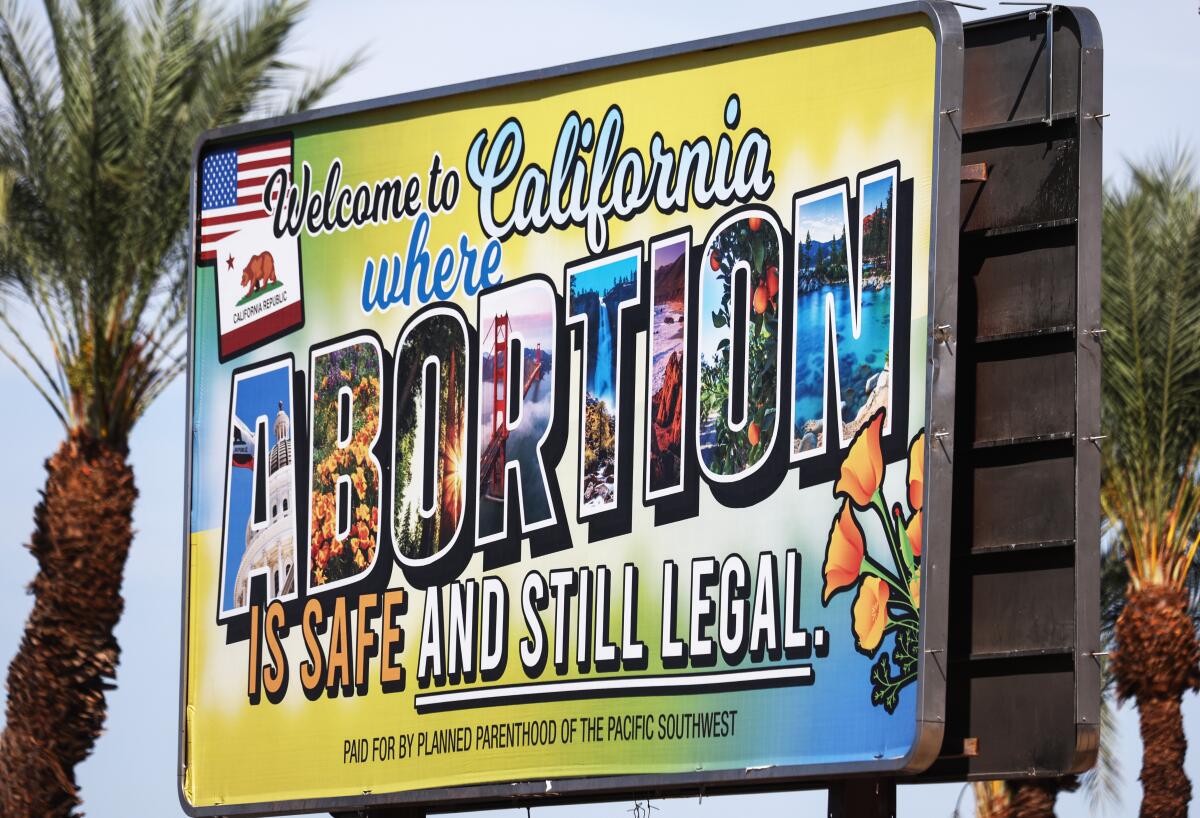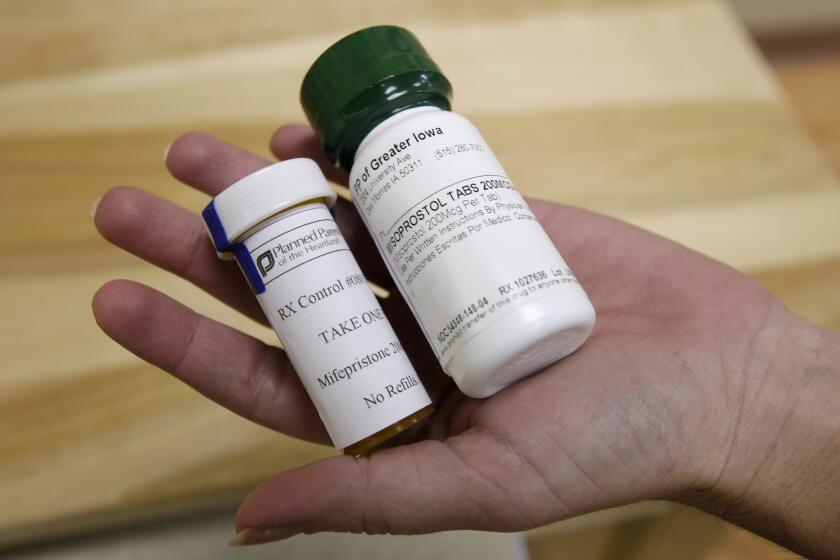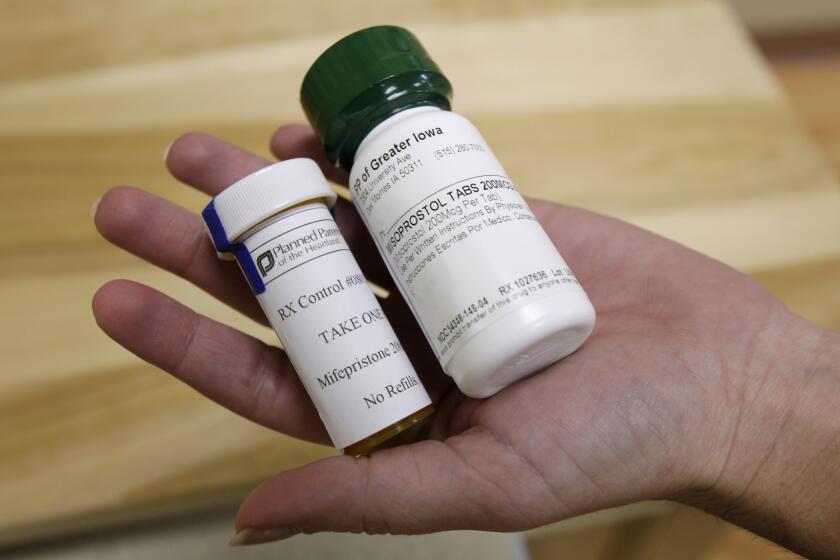Would a nationwide abortion ban be constitutional?

- Share via
The Supreme Court on Friday ruled to preserve access to mifepristone, a drug used in half of all U.S. abortions. The decision sends the case back to the lower courts, and the legal battle over U.S. District Court Judge Matthew Kacsmaryk’s ruling this month to block FDA approval of the drug will continue.
Kacsmaryk’s attack on the abortion pill is chock full of audacious legal assertions. One of its most alarming aspects is its resurrection of the Comstock Act, a 150-year-old law that, if taken to the logical end advanced by antiabortion forces, would make a federal crime out of every abortion performed in America.
Enacted as part of an anti-vice crusade in 1873, the Comstock Act prohibits, among other things, the mailing or interstate carrying of “every article or thing designed, adapted, or intended for producing abortion.” As Mary Ziegler, a law professor at UC Davis, warned in these pages, Kacsmaryk’s Comstock Act interpretation is “explosive” because all such procedures rely “on drugs and devices that might be mailed to clinics, hospitals and doctors offices.”
On the Biden administration’s watch, the Comstock Act will never be enforced this way. Administration attorneys argue that the law applies only to the mailing of drugs with the intent that they be used unlawfully. Because mifepristone has multiple legitimate uses, the mere act of mailing it to a jurisdiction where abortion is banned is “insufficient” to show that the sender intended it be used illegally. Such a reading is rooted in nearly a century’s worth of judicial precedent that Congress has never overturned.
The decision suspending FDA approval of mifespristone reads like an antiabortion pamphlet and carries a clear message: The judge thinks he won’t be held accountable.
But if Kacsmaryk’s interpretation of the act is allowed to stand, once a Republican is back in the White House, all bets would be off. Abortion, no matter the method, could be criminally punished even where the procedure is legal as a matter of state law.
There is, however, a way to counter Kacsmaryk’s ruling that would be difficult for even the current antiabortion Supreme Court majority to evade.
Remember that before last year’s Dobbs vs. Jackson Women’s Health Organization ruling, the right to abortion was protected by two provisions in the U.S. Constitution. The 14th Amendment due process clause recognized abortion as a “liberty” protected against state deprivation. And the 5th Amendment due process clause protected abortion as a “liberty” against encroachment by the federal government.
Editorial: The only thing certain about medication abortion is the confusion over how to get it
A federal appeals court has ruled that mifepristone, one of two drugs used in medication abortion, can remain on the market as a court case over whether it was properly approved by the FDA continues.
In upholding Mississippi’s 15-week abortion ban, Dobbs overturned the 14th Amendment right to abortion. But because no federal law was at issue, Dobbs did not overturn the 5th Amendment right. Quite the opposite: The “history and tradition” test that Dobbs announced strongly suggests that a 5th Amendment abortion right is on firm footing.
Dobbs says that the test for knowing if abortion is a constitutionally protected “liberty” is whether it was “deeply rooted in history and tradition” at the time of the relevant constitutional amendment’s enactment. Dobbs asserted that the “most important historical fact” that negated a 14th Amendment right to abortion is that many states banned abortion throughout pregnancy when that amendment was ratified in 1868.
But if that is the correct test, then to decide if there remains a 5th Amendment right to abortion, the court would have to ask about the “history and tradition” of access to abortion in 1791, when that amendment was ratified. And as Dobbs concedes, at that point in time every single state in the union embraced the “quickening rule”: Medically safe abortions were punished only if they were performed after the fetus moved in the womb, usually at 16 to 18 weeks in pregnancy.
Rigorous research tracking the mental health of women who’ve had abortions doesn’t support the claim that mifepristone is psychologically damaging.
Under the Dobbs test, then, the centuries-old, uniform tradition of permitting pre-quickening abortion supports a 5th Amendment right to abortion well into the second trimester of pregnancy. And that means efforts by antiabortion forces to ban abortion nationwide via the Comstock Act would be unconstitutional.
Antiabortion advocates might argue that the mere absence in 1791 of state bans on pre-quickening abortion should not create a countervailing right to abortion. But the conservative Supreme Court justices rejected a similar argument in another case last year that hinged on “history and tradition,” this time with the effect of radically expanding access to guns.
New York State Rifle & Pistol Assn. vs. Bruen challenged a New York law that restricted “public carry” to those who could demonstrate a need for self-protection. The Supreme Court held that the 2nd Amendment rendered that law unconstitutional because similar restrictions were not in place during early U.S. history. New York’s gun safety law was therefore not “consistent with this Nation’s historical tradition.” Already federal courts have applied this rule to extend constitutional protection to eye-opening forms of conduct, including a domestic violence offender’s desire to possess a gun, all for the mere reason that states did not enact comparable bans centuries ago.
The Supreme Court said it was temporarily keeping in place FDA rules for the abortion drug mifepristone while it more fully considers issues.
Yet if the absence of particular gun control laws at the founding means such laws are unconstitutional today, then the absence of any total ban on abortion in 1791 means that such a law would also now be unconstitutional. In other words, either the court can uphold the Comstock Act as a nationwide abortion ban or it can offer sweeping new constitutional protections to gun owners. It cannot logically or consistently do both.
In the end, hand-wringing over the Comstock Act and how the Supreme Court may interpret it is entirely avoidable. Congress can — and should — repeal the 1873 act for many reasons. To the extent the law can be read to block access to safe medication used by pregnant people, it intrudes dangerously on private, medical decisions. Its criminal penalties for abortion are completely out of step with the attitudes and beliefs of the American people.
And by flouting the history of access to abortion at the founding, it is inconsistent with even the current Supreme Court’s ultraconservative approach to constitutional rights.
Aaron Tang is a law professor at UC Davis, and a former law clerk to Justice Sonia Sotomayor. This essay is based on a forthcoming article in the Stanford Law Review. @AaronTangLaw.
More to Read
Updates
5:01 p.m. April 21, 2023: This article has been updated to reflect the Supreme Court’s ruling on Friday.
A cure for the common opinion
Get thought-provoking perspectives with our weekly newsletter.
You may occasionally receive promotional content from the Los Angeles Times.













